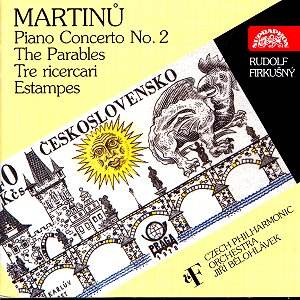 |
Bohuslav MARTINU (1890-1959)
|
Behlolávek before he became a hot property for Chandos. Definitely worth experiencing and all the more so because the recording is in modern sound.
The Piano Concerto No. 2 is actually Martinu's first for piano with full orchestra. The one designated number 1 is a work from 1925 with chamber ensemble. The Second was dedicated to Germaine Leroux but was premiered in 1935 by Firkusny who was the dedicatee of the Third Concerto. It is a work of unoppressive flighty innocence. Its fluent runs and rolls and active orchestral web are suggestive of Prokofiev at times and Poulenc at others. The brilliance of the John Ireland concerto also occurred to me. The second of the three movements combines a yearning character with a lean textured approach. Firkusny despatches the solo part to the manner born. In 1990 he performed this work at the Prague Spring Festival on his return to a homeland freed from no-choice communism. His recording made at the Rudolfinum in June 1993 and issued as a Firkusny tribute by BMG in 1994 is to be marginally preferred for a richer recording. He played the world premieres of Martinu's second, third and fourth piano concertos all of which were written for him. They are coupled on BMG 09026 61934 2. In the BMG version the Firkusny dwells on the middle movement for almost a full minute longer than the Supraphon. Behlolávek had recorded the second in company with the Piano Concertino and the four other concertos in 1986 and 1989. In this case the pianist was Emil Leichner who took an even more leisurely pace in all three movements. The pastoral Beethovenian-Brahmsian element is much more to the fore in Leichner's hands. The resilient music carries all these differing approaches.
The Estampes (or Engravings) date from 1958 and begin in Webern-like indeterminacy, clicking and pecking. The programme notes hazard a connection with Debussy's piano suite of the same name and there is an impressionistic and experimental air to this music which reads like a sketchbook for Martinu's exploration of how seemingly alien techniques could be bent and melded to his inspiration. Played innocent ear style to someone familiar with the style it would soon enough be recognised as Martinu but there are many passages which strain at the edges of what we expect from the man from the Policka church tower. He was alive to the need for renewal even in older age. The Adagio with its half hiccoughing half dancing ostinato is well worth your attention with an oboe dancing in drenched Provençal warmth. The harp, mandolin and guitar evocations of the Poco Allegro suggest familiarity with Copland. Not at all surprising given Martinu's locale. While lacking in compulsive melodious invention - except in the wonderful Adagio movement - this work is one to be treasured. Its experimentation rings familiar bells with the mysteries of Gilgamesh.
The Parables were written in the same year as the Estampes and are instantly recognisable as prime Martinu. These effervesce and rush in an access of delight taking in, along the way, the tenderness of Copland. While the 'winds of war' chill the second Parable the third and final movement recaptures the dynamic force that lifts and floods so much of his best music. The mezza voce tense shrieking of the strings recalls the hair-raising supernatural elements in Gilgamesh. The music glows as it should in Behlolávek 's hands but even more compelling for its Sibelian edginess and energy and devastating whooping horns is the 1961 stereo version conducted by Ancerl on Supraphon 11 1931 2 001 coupled with Ancerl's mono Fifth and Lidice and the stereo Frescoes. That Ancerl is a prime disc belonging in any core Martinö collection. The Parables also appear on Panton 81 1204-2 but they are taken in such a somnolent way that I could not recommend them.
The other work from the 1930s is the Tre Ricercari for chamber orchestra. It was commissioned for the International Festival of Contemporary Music in Venice where it was accorded its premiere. It is a delicate translucent concerto grosso with, typically, a central role for the piano - two in fact. The orchestra comprises five woodwind, two trumpets, six strings. This has less of the restlessness of the second piano concerto and more of the light-suffused warmth of the later works. The woodwind writing shows lessons learnt from Stravinsky but with a more vulnerable humane face. It steers away from the darkness of the exactly contemporary Double Concerto. This is more in the nature of a sincere sophisticated serenade-cassation than an exploration of the germs of an impending personal and political tragedy. It has been issued before by Supraphon (11 0381-2) with the Sinfonia Concertante and the Concerto Grosso though the playing time was only 49.20. That issue did however feature the most heart-warming colour photo of Martinu and his wife. The pianists are Josef Ruzicka and Jaroslav Saroun. I have been able to compare two other recordings. The over-warmly cocooned version with James Conlon conducting the Orchestre National de France (pianists: Jean-François Heisser and Alain Planès) is a very decent performance and should be snapped up especially in the cheap Erato Warner Ultima 'twofer' series. Its number is 3984 24238 2. Currently unavailable but well worth transferring from LP is the Turnovsky version on the same 1960s Supraphon LP as the best ever version of the Fourth Symphony - SUAST 50669. Turnovsky's ambience is drier than Conlon's but their speeds are very similar. The Conlon and Turnovsky are to be preferred to Behlolávek 's drowsier pacing though his is the richer recording.
Rob Barnett